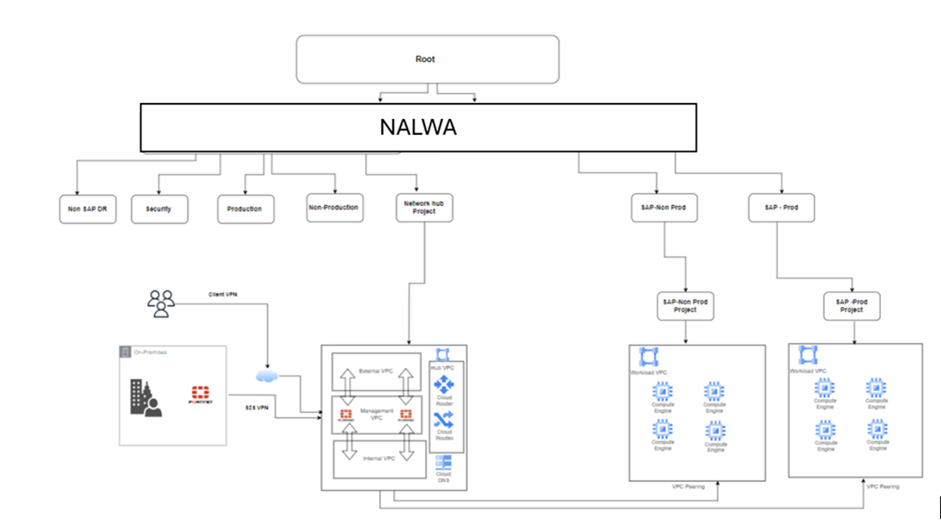Region
India
About the Company
Nalwa Steel and Power Limited (NSPL), a blue-chip unit of the O.P. Jindal Group, is in full-fledged production at Raigarh (C.G.). It is an Integrated Steel Plant with the present capacity of 0.36 million ton finished steel and spread over an area of 220 acres with 33% under Green Cover.
Customer Requirement and Challenges
The Nalwa Steel and Power Limited team reached out to the Redington team to analyze and get an assessment done for their current infrastructure to provide with our Migration Readiness Assessment of SAP Application workloads because their current on-premises SAP infra was about to expire, and they were also facing lots of latency and performance issues. Redington Limited, being an Advanced Consulting and Partner for GCP, has deployed and configured SAP infra for the NALWA Steel on GCP.
Challenge:
- On premises SAG Infra causing latency and performance issues. Need for migration to GCP involving assessment, planning, phased migration from application to production environments and management.
- Establishing two SAP S/4 HANA application environments for testing & implementing secure communications to three physical locations
Overview and Architecture
Deployed and migrated the SAP application workloads on GCP with scalable and secure all deployments paired with Redington’s workloads and migration capabilities.
Along with subscription licenses from GCP to enjoy the support and benefits of BYOL (Bring Your Own License). Choose from multiple deployment options for SAP application workloads.
- Cloud VPN
- Compute engine
- Load balancing
- Cloud logs and monitoring
- Cloud NAT
- Cloud Storage
High level Architecture:
The below diagram outlines a Google Cloud Platform (GCP) landing zone architecture centered around a common “Root,” supporting NALWA domain. NALWA encompasses diverse environments such as Non-SAP DR, Security, Production, Non-Production, and a Network Hub Project, interconnected via VPC peering. NALWA also interconnected with SAP environments segregated into Non-Prod and Prod, each hosted in isolated VPCs and linked through VPC peering. A centralized Network Hub Project facilitates connectivity among on-premises infrastructure, client VPN, and various internal and external VPCs, ensuring organized network management and secure communication across environments and projects.

Architecture of Proposed Migration approach
The below Architecture diagram depicts a Google Cloud Platform (GCP) architecture in the Mumbai region with a VPC divided into public and private subnets. The public subnet includes a Cloud Router, Jump Server, and OpenVPN for secure user access. The private subnet hosts an Application Server and a Database Server, with Cloud NAT enabling outbound internet access. Additional components include Cloud Firewall Rules for traffic management and Cloud Storage for scalable data storage. This design ensures secure, controlled access to resources

Assessment & Deployment:
Assessment: Finalizing the required details to deploy servers.
- Inventory: Conducting a detailed inventory of existing SAP applications and database servers.
- Dependencies: Identifying and documenting all application dependencies.
- Timeline: Defining the migration timeline.
- Resources: Assigning roles and responsibilities for the migration team.
- Risk Management: Identifying potential risks and developing mitigation strategies.
- Validation: Planning for post-migration validation and performance testing.
Deployment:
- Compute Engine instances- Assigning SAP certified instances to appropriate subnets and attaching persistent disks.
- Fulfilling network and security requirements including designing VPC with private and public subnets, setting up VPC, subnets, Cloud NAT, site-to-site VPNs, and OpenVPN; deployment of pfsense firewall, VPN configurations, and other security measures.
- Storage and Backup- Configuring 7.4 TB of cloud storage for various data files and backup strategy for critical data.
- Initial Data Load, Synchronization & Migration- Using tools like Gsutil or Cloud Storage Transfer Service for data transfer and ensuring database integrity and consistency during the cutover phase. Starting with migrating the application environment.
- Test Run and Validating- Conducting functional, performance & security tests and performing consistency checks & validate database integrity. Ensuring all network configurations, including VPNs, NAT, and firewalls, are correctly set up.
- SAP Applications- Configuring SAP applications and database connections on GCP instances. : Integration with internal applications and services.
- Post Migration Tests and Monitoring- Conducting functional testing for all migrated SAP applications to ensure they are working as expected and comparing performance metrics with pre-migration benchmarks to ensure optimal performance. Carrying out a final validation of the migrated environment to ensure all systems are functioning correctly. Setting up continuous performance monitoring and alerting.
Following these steps ensures a smooth and successful migration of SAP applications to GCP, maintaining high availability, performance, and security.
Summary
- GCP supports auto-scaling, enabling seamless adjustments to computing resources based on real-time demands, ensuring optimal performance and cost-efficiency for applications and services.
- Tracking, analyzing, and optimizing cloud infrastructures performance and resource allocation in real-time within Google Cloud Platform (GCP), ensuring maximum efficiency and minimum downtime.
- Managed Service Reports delivered comprehensive recommendations for infrastructure optimization and cost savings, meticulously tailored to align with consumption analysis in Google Cloud Platform (GCP), along with a team of expert professionals.
Redington can help customers not only migrate but also modernize their workloads with GCP. Our cloud experts help customers in their transformation journey right from the assessment of their landscape to be migrated to designing and delivering the solution that is unique to their requirements.





